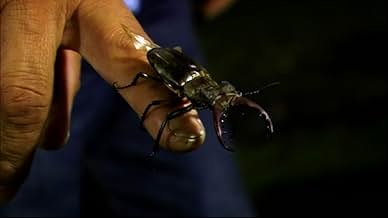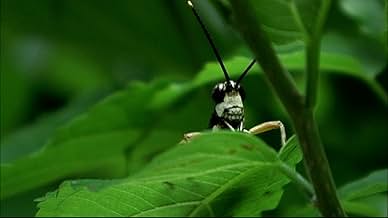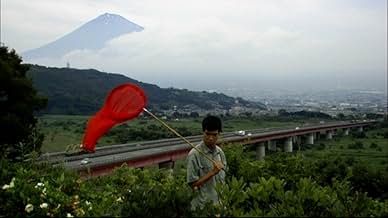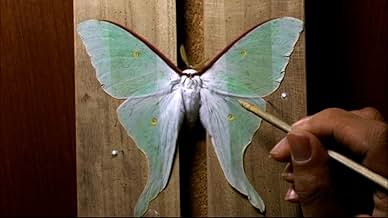Añade un argumento en tu idiomaUntangling the web of cultural and historical ties underlying Japan's deep fascination with insects.Untangling the web of cultural and historical ties underlying Japan's deep fascination with insects.Untangling the web of cultural and historical ties underlying Japan's deep fascination with insects.
- Dirección
- Guión
- Premios
- 2 premios y 4 nominaciones en total
Argumento
¿Sabías que...?
- Banda sonoraKafka
Written by Ryuichi Sakamoto
Performed by Masami Tsuchiya
Originally released by Epic
Courtesy of Sony Music Entertainment (Japan) Inc.
By arrangement with Sony Music Entertainment
Reseña destacada
This documentary meanders quite a bit, and it's as often into arthouse type street scenes as it is into footage of actual insects, so if you're looking for a hardcore film about bugs that's chock full of facts, this isn't it. However, I was drawn to its gentle ways and the bits of philosophy intermixed with little kids delighting in creepy crawlies. I liked how it was just as much about Japanese culture, and how even that was mostly related tangentially, through a seemingly random series of images. Through it all it gets across its central theme, which is a lovely sense of man's harmony with nature. Don't step on those bugs guys, appreciate them, and be open to learning about yourself through them, as one of those interviewed says. Anyway, I had no idea what was going to be put up on the screen next over its 90 minute runtime, and while not all of it worked, it always had quirky charm.
Some quotes: "According to Mono No Aware, true beauty is found in that which does not last, and includes the gentle sadness felt as it fades. Mono No Aware expresses the capacity of the Japanese to experience the objective world both internally and directly, without having to resort to language or other intermediaries. This connection is granted by the understanding that all life and nature is cohesive."
"Haiku is the expression of a precise view of nature, personal and universal in equal parts. It is the distillation of time, a representation of a single spontaneous moment - an eternity captured in a mundane instant of reality. Haiku is an interpretation of the brevity of life and the never-ending cycle of nature, the unyielding passing of the seasons. ... Haiku is man as part of nature, or more exactly, man as nature."
"In The Tale of Genji, written by Murasaki Shikibu, a Japanese courtesan at the turn of the 11th century, the character of Genji relates his broken heart to the visible light of the firefly: 'Fireflies rule the night, and it is sad to see them, when at every hour one burns with the searing flame of love now lost forever.'"
"Similar to haiku, the (Zen) gardens were meant to be a representation of the universe, scaled down to allow for the contemplation and mediation of its nature. The miniaturization of everyday objects and the shrinking of worlds, as with Zen gardening or bonsai, lends itself to the exposition of nature's smallest creatures. Insects, which could easily have been the inhabitants of these diminutive universes, could be loosely recognized as their translators, beings that held all of the truths of nature in their tiny, delicately ergonomic lives."
Some quotes: "According to Mono No Aware, true beauty is found in that which does not last, and includes the gentle sadness felt as it fades. Mono No Aware expresses the capacity of the Japanese to experience the objective world both internally and directly, without having to resort to language or other intermediaries. This connection is granted by the understanding that all life and nature is cohesive."
"Haiku is the expression of a precise view of nature, personal and universal in equal parts. It is the distillation of time, a representation of a single spontaneous moment - an eternity captured in a mundane instant of reality. Haiku is an interpretation of the brevity of life and the never-ending cycle of nature, the unyielding passing of the seasons. ... Haiku is man as part of nature, or more exactly, man as nature."
"In The Tale of Genji, written by Murasaki Shikibu, a Japanese courtesan at the turn of the 11th century, the character of Genji relates his broken heart to the visible light of the firefly: 'Fireflies rule the night, and it is sad to see them, when at every hour one burns with the searing flame of love now lost forever.'"
"Similar to haiku, the (Zen) gardens were meant to be a representation of the universe, scaled down to allow for the contemplation and mediation of its nature. The miniaturization of everyday objects and the shrinking of worlds, as with Zen gardening or bonsai, lends itself to the exposition of nature's smallest creatures. Insects, which could easily have been the inhabitants of these diminutive universes, could be loosely recognized as their translators, beings that held all of the truths of nature in their tiny, delicately ergonomic lives."
- gbill-74877
- 14 ene 2023
- Enlace permanente
Selecciones populares
Inicia sesión para calificar y añadir a tu lista para recibir recomendaciones personalizadas
Detalles
Taquilla
- Recaudación en Estados Unidos y Canadá
- 32.308 US$
- Fin de semana de estreno en EE. UU. y Canadá
- 6498 US$
- 16 may 2010
- Recaudación en todo el mundo
- 32.308 US$
- Duración1 hora 30 minutos
- Color
Contribuir a esta página
Sugerir un cambio o añadir el contenido que falta

Principal laguna de datos
By what name was Beetle Queen Conquers Tokyo (2009) officially released in Canada in English?
Responde






